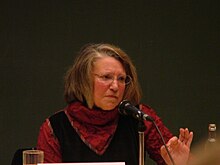Nancy Fraser
Nancy Fraser (born May 20, 1947 in Baltimore ) is a philosopher and one of the most famous American feminists .
Fraser is currently Professor of Political Science and Philosophy at the New School in New York City . Together with Andrew Arato , she is the editor of Constellations , an international journal for critical theory and democratic theory . In 2010 she won the Alfred Schutz Prize of the American Philosophical Society and has been a member of the American Academy of Arts and Sciences since 2019 . Her work focuses on deliberative democracy , the emergence of transnational publics, and feminist theory.
From 2011 to 2014 Fraser Einstein was a Visiting Fellow at the John F. Kennedy Institute for North American Studies at the Free University of Berlin.
Positions
Since 2009 Fraser has been concerned with the appropriation of feminism of the second women's movement (from the 1960s) by neoliberal capitalism. In this context she speaks of the “ruse of history”. With the rise of globalization and neoliberalism, the left have sought a new field of activity after Fraser. Because the means were taken out of their hands to pose the social question in terms of power politics, they switched to the field of symbolic recognition: Nobody should be discriminated as a consumer . In doing so, they unwittingly formed an alliance that Nancy Fraser calls "progressive neoliberalism".
In particular the women's movement - like other up-and-coming progressive movements - made the mistake of sacrificing the issue of social equilibrium to a false "understanding of emancipation under the auspices of achievement, diversity and empowerment" with a high moral claim to "building a meritocratic performance society ", the" storm propagated on the management floor "and the simple service work shifted to" poor, colored migrants ", while the" old industry was on the dog ". This neoliberal feminism pursued a pure politics of recognition or difference.
criticism
Critics see Fraser's criticism of difference feminism, which in retrospect also refers to developments in the 1960s and 1970s, as a caricature of the politics of the New Left of that time, a general reckoning with the 1968s “and everything that followed from it [...] then to return to the rusty home port of the old left with its main / secondary contradiction thinking and the subordination of all other topics, concerns and movements under the hegemony of the 'workers movement' [...] ”. These movements were about much more than recognition.
Fonts in German translation (selection)
- Justice halved. Key terms of the post-industrial welfare state (“Justice interruptus”). Suhrkamp, Frankfurt / M. 2001, ISBN 3-518-11743-2
- Reframing Justice in a Globalizing World . In: New Left Review , Vol. 36, 2005 (also online )
- The dispute over difference. Feminism and Postmodernism in the Present . Suhrkamp, Frankfurt / M. 1993, ISBN 3-596-11810-7 (together with Seyla Benhabib , Judith Butler and Drucilla Cornell )
- Redistribution or recognition? A political and philosophical controversy . Suhrkamp, Frankfurt / M. 2003, ISBN 3-518-29060-6 (together with Axel Honneth )
- Unruly Practices. Power, discourse, gender (“unruly practices”). Suhrkamp, Frankfurt / M. 2003, ISBN 3-518-11726-2 .
- "For a new left or: The End of Progressive Neoliberalism" (Original: The End of Progressive Neoliberalism), published in the dissent magazine January 2017 in English online , in German translation online at Blätter für Deutsche und Internationale Politik
- What's wrong with democracy? A debate with Klaus Dörre, Nancy Fraser, Stephan Lessenich and Hartmut Rosa , edited by Hanna Ketterer and Karina Becker. Suhrkamp, Berlin 2019, ISBN 978-3-518-29862-6 .
- with Rahel Jaeggi : Capitalism. A conversation about critical theory . Suhrkamp, Berlin 2020, ISBN 978-3-518-29907-4 .
Web links
- Literature by and about Nancy Fraser in the catalog of the German National Library
- Nancy Fraser at the New School for Social Research
- Constellations Journal
- Women, think economically! . TAZ, April 7, 2005.
Individual evidence
- ^ Nancy Fraser . In: Einstein Visiting Fellows. Einstein Foundation Berlin, accessed on May 23, 2018.
- ↑ Gudrun-Axeli Knapp: In Contrast. Feminist theory in motion. Wiesbaden 2012, p. 13.
- ^ Cornelia Klinger: Gender in Troubled Times. On the coincidence of feminism and neoliberalism. In: The Future of Gender. Concept and diagnosis of time (Ed. Anne Fleig). Frankfurt and New York 2014, p. 134: "[...] the feminist intentions would have literally promoted the neoliberal transformation of capitalist society, if not even justified."
- ↑ Nancy Fraser (2009): Feminism, Capitalism and the List of History (PDF).
- ↑ See Nancy Fraser (2013): Neoliberalism and Feminism: A Dangerous Liaison
- ↑ Fraser, Redistribution or Recognition? A political and philosophical controversy. 2003.
- ↑ Nancy Fraser: From the rain of progressive neoliberalism to the eaves of reactionary populism. In: Heinrich Geiselberger (Ed.): The great regression. Berlin 2017, pp. 77–91, here: pp. 80, 81, 90.
- ↑ Detlef Georgia Schulze: What Nancy Fraser is still wrong. In: Neues Deutschland, May 24, 2017.
| personal data | |
|---|---|
| SURNAME | Fraser, Nancy |
| BRIEF DESCRIPTION | American political scientist and feminist |
| DATE OF BIRTH | May 20, 1947 |
| PLACE OF BIRTH | Baltimore |
